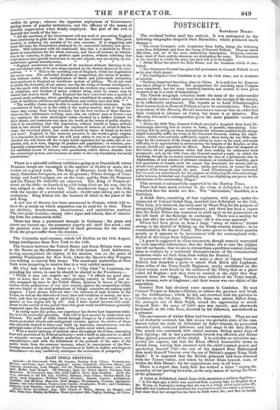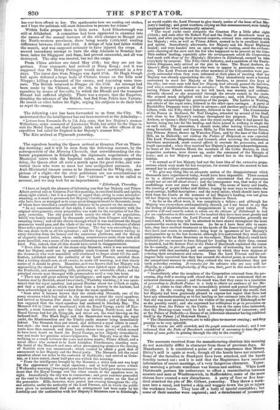POSTSCRIPT.
SATURDAY NIGHT.
The overland Indian mail has arrived. It was anticipated by the following telegraphic despatch from Marseilles ; which produced much dismay-
•
" The Great Liverpool, with despatches from India, brings the following news from Jellalabad, and from the Camp of General Pollock. They are dated 22d June, and are of the most melancholy description. Sickness, extreme heat, want of food, and the simooms, are decimating the army. The discontent at the inaction in which the army has been left is at its height.
Akbar Khan has seized the Bala Hisser and the treasures which it con- tained.
" The Governor-General has given full permission to General Pollock to act as he may think proper. " The intelligence from Candahar is up to the 11th June, and is destitute of interest.
"Nothing important has taken place in China. It is said that the Emperor has taken refuge in Tartary. The preparations for marching upon Chappoo were completed; but the army remained inactive, and seemed to have given themselves up to a state of despondency." The French telegraph certainly made the most of the unfavourable. nature of the news ; which proves, however, on the receipt of the details, to be sufficiently unpleasant. The reports as to Lord Ellenborongh's final instructions to General Pollock seem to be contradictory. The cor- respondent ot' the Morning Herald mentions a rumour that an order had been received to advance on Cabul, but treats it as delusive. The Morning Chronicle's correspondent gives the most plausible version of the story-
" About the 29th May, General Pollock received a despatch from Lord El- lenborough, directing him to return to India, if possible, immediately. Con- ceiviug that by acting on these instructions the interests confided to his charge might materially suffer, he wrote to the Governor-General, stating his objec- tions; which were certainly sufficiently cogent ; there being far too little car- riage for the transport of the troops and stores, no water on the road, and much difficulty to be apprehended in surmounting the heights of the Khyber, at this season, should any opposition be offered. Some few days after the despatch of this letter, all the preparations which had been making for retirement were. postponed; and, on the 13th June, the General received a reply, in which his Lordship, though by no means countenancing the idea of a permanent stay in Afghanistan, or any scheme of ultimate conquest, or retributive hostility, gave him permission to remain until the season was favourable for return' and he should have procured sufficient carriage, cattle, and stores, to insurethe safe progress of his troops through the pass. Lord Ellenborough also instructed him to send out detachments for the purpose of destroying the forts and strong- holds between Jellalabad and Jugdulluck, and thus displaying our power to the inhabitants of the surrounding villages."
This account is substantially supported by the Bombay Times.
There had been much sickness in the camp at Jellalabad ; but it is remarked that the deaths are few. The "decimation," therefore, is a Gallicism.
A Seikh force, consisting of four regiments, with guns, under the command of Colonel Golab Sing, marched into Jellalabad on the 11th. This body, it is believed, has been sent by Sheer Sing for the purpose of occupying Jellalabad on our retirement ; and there has been a report that the Seikh Prince has consented to yield up to us his possessions on the left bank of the Sutledge in exchange. There was a mutiny for pay just after the arrival of the troops; but it was soon appeased. Orders had been given to form a large "army of reserve," 20,000- strong, in the district of Sirhind, on the North-western frontier ; to be commanded by Sir Jasper Nicoll. The name given to this force puzzles people, as it appears to be inconsistent with the contemplated with- drawal of the troops from Afghanistan. [A guess is suggested by these statements, though scarcely warranted by such imperfect information, that the Seikhs are to take the Afghan. war off our hands ; that we are to retreat from a profitless contest, leaving them to retaliate by a territorial dismemberment of the contumacious borderers while we back them from within the frontier.] In pursuance of the suggestion to make a show of vigour, General Pollock had detached a party to attack Pesh Bolak and Luglimati. Some relics of the Forty-fourth Regiment, nearly annihilated on the Cabul retreat, were found by the soldiers of the Thirty-first at a place called Ali Boghan ; and they were so excited at the sight that they burned down the village. Twenty-four soldiers of the Forty-fourth, and a woman, were at Lughman ; and their rescue was one object of the expedition.
General Nott had obtained some success in Candahar. He sent- Colonel Wymer to Klielat-i-Ghilzie, to relieve the garrison and break up the fortifications ; which he did, and returned with the garrison to Candahar on the 7th June. While his force was absent, Suftur Jung, the youngest son of Shah Sujah, seized the opportunity to attack General Nott : his army of 3,000 men was routed ; and afterwards he himself, on the 19th June, deserted by his followers, surrendered as a prisoner.
The movements of Akbar Khan had been remarkable. They are not at all distinctly narrated, but this seems the probable state of the case. Beaten before the walls of Jellalabad by Sale's brigade, he proceeded towards Cabul, collected followers, and laid siege to the Bala Hisser. The attack was continued, with varied success, during many days of hard fighting ; till at last a practicable breach was effected, and Akbar Khan gained possession of the citadel. It is said that no atrocities suc- ceeded the capture, but that the Khan offered honourable terms to Futteh Jung, leaving him invested with the chief nominal power, and appointing himself Vizi—the son of the deposed Dost Mahommed thus made himself Viceroy over the son of Britain's puppet King, Shah Sujah ! It is supposed that the British prisoners had been removed from the Tezeen valley, and taken by Akbar Khan beyond, near, or within the Bala Hisser; for the suppositions vary in all ways. There is a report that Lady Sale has written a letter " urging the necessity of our moving forwards, as the only means of saving the lives of the prisoners."
A letter at Jellalabad, dated June 26th, mentions a solitary fugitive- " A few days ago, a letter was received from a young lady, (a dougqer oa Mr. Wynn, at Kurnaul,) stating that she was in a village about eight miles off; that after her husband WIWI murdered she wandered on and was taken a prisoner. that since then her occupation has been to fetch water, dc.; and that no insult
has ever been offered to her. The apothecaries here are sending out clothes, and I hope the politicals will exert themselves to procure her release."
'Within India proper there is little news. Lord Ellenborough was still at Allahabad. A committee had been appointed to examine into the causes of the annual increase of the civil charges in Bengal and the North-western provinces, there being nearly 1,000,0001. sterling difference between 1835 and 1841. A deluge of rain had fallen within the month, and was supposed seriously to have injured the crops. A second incendiary attempt to burn the ship Adelaide in Bombay har- bour, laden for Singapore and Siam, had proved successful, and all was destroyed. The ship was insured, but not the cargo.
From China advices are dated May 27th; but they are not im- portant. Four transports had arrived at Hong Kong ; and it was supposed that Sir Henry Pottinger would move northward in a few days. The latest date from Ningpo was April 27th. Sir Hugh Gough had again defeated a large body of Chinese troops on the hills near Ningpo ; killing a thousand of the enemy, and capturing some trea- sure. The British returned to Ningpo on the 17th. An attempt had been made by the Chinese, on the 5th, to destroy a portion of the squadron by means of fire-rafts, by which the Blonde and the transport Ernaad had suffered slightly. There was a report, that the Emperor, dreading the advance of the British, had fled from Pekin into Tartary. He issued an edict before his flight, urging his subjects to do their best to repel the enemy.



























 Previous page
Previous page